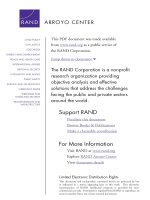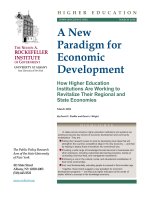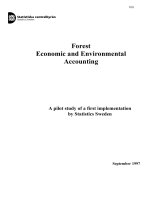A NEW PATTERN for A TIRED WORLD by LOUIS BROMFIELD pptx
Bạn đang xem bản rút gọn của tài liệu. Xem và tải ngay bản đầy đủ của tài liệu tại đây (20.58 MB, 346 trang )
A
NEW
PATTERN
for
A
TIRED
WORLD
by
LOUIS
BROMFIELD
Arno
Press & The New
York
Times
New
York
• 1972
Reprint
Edition
1972
by
Arno
Press
Inc.
Copyright
© 1954 by Louis Bromfield
Reprinted
by arrangement
with
Harper
&
Row,
Publishers.
All
rights
reserved.
Reprinted
from a copy
in
The
State
Historical
Society
of
Wisconsin
Library
LC#
72-174234
ISBN
0-405-00416-8
The
Right
Wing
Individualist
Tradition
in
America
ISBN
for
complete
set:
0-405-00410-9
See
last
pages
of
this
volume
for
titles.
Manufactured
in
the
United
States
of
America
A
New
Pattern
for
a
Tired
World
I
I
I
I
I
I
I
I
I
I
I
I
I
I
I
I
I
I
I
I
I
I
I
I
I
I
I
I
I
I
I
I
I
I
I
A
NEW
PATTERN
for
A
TIRED
WORLD
by
LOUIS
BROMFIELD
HARPER
&
BROTHERS,
PUBLISHERS
New
York
A
NEW
PATTERN FOR A TIRED WORLD
Copyright, '954,
by
Louis Bromfield
Printed in the United States
of
America
All rights in this book are reserved.
No
part of the book may be used
or
reproduced
in any manner whatsoever without written per-
mission except in the case of brief quotations
embodied in critical anicles and reviews.
For
information address Harper & Brothers
49
East 33rd Street,
New
York
16,
N.
Y.
FIRST
EDITION
A-D
Library
of
Congress catalog card number: 53-11829
Contents
Marked· While Engaged in the Lost
Art
of
Reading
Vll
Author's
Note
xxv
I Government
by
Propaganda and Pressure
II
The
Fallure of a Policy 2 I
III
A Brave
New
World
76
IV Dynamic Capitalism
vs.
Capitalism
by
Inertia
130
v
The
World
Failure and Decline of the Marxian Illusion
180
VI
Summary
Notes
I
I
I
I
I
I
I
I
I
I
I
I
I
I
I
I
I
I
I
I
I
I
I
I
I
I
I
I
I
I
I
I
I
I
I
I
I
I
I
I
I
I
I
I
I
I
I
I
I
I
I
I
I
I
I
I
I
I
I
I
I
I
I
I
I
I
I
I
I
I
I
I
I
I
I
Marked While Engaged in
the
Lost
Art
of
Reading
1.
LIBERALISM
Blaming the other fellow
is
sterile diplomacy;
it
is
much more important
to
make a new start.
TOM
DRIBERG,
British Labor
M.
P. in
Time
Magazine
It
is
also false that, to be liberal, we must see government
as
the sole
agent
of
advance. Has not the initiative.and genius
of
one
man-George
Washington
Carver-done
at least
as
much for the "progress and re-
form"
of
the South
as
the govemment'sballyhooed
TVA?
Do
we dis-
believe in "progress and reform" simply because we trust the spon-
taneous energies
of
free men, and distrust Washington?
E.
MERRILL
ROOT,
"Are the 'Liberals' Liberal?,"
Human Events, September
23,
1953
True
liberalism
is
found not in striving to spread bureaucracy, but in
striving to set bounds to it.
True
liberalism seeks all legitimate freedom,
in the confident. belief that. without freedom, all other blessings are
vain. Liberalism
is
a force truly of the spirit coming from a realization
that economic freedom cannot be sacrificed
if
political freedom
is
to
be preserved.
HERBERT
HOOVER,
from an address at Case Institute
of
Technology, Cleveland, Ohio, April I
I,
1953
Is
there an open season for treason,
as
there
is
for deer .hunting and
trout
fishing? This question
is
posed
by
Mrs. Eleanor Roosevelt. Ac-
cording to an A.P. dispatch from Seattle, she deplored the "furore"
over the
White
case,
as
she once deplored the exposure
of
her friends,
Alger Hiss and Lauchlin Currie. Mrs. Roosevelt
is
quoted
as
adding that
a change
has
occurred in the nation's "moral climate," "placing the case
of
White
in
a·
different· perspective from 1946."
The
vast majority
of
Americans, one suspects, would be inclined
to
paraphrase a saying
of
Calvin Coolidge in this connection.
There
is
no right
to
commit treason
and espionage,
or
to abuse governmental· office
to
advance the·interests
of
a foreign power, under any circumstances, in any year, at any time.
THE
FREEMAN,
an editorial
vii
viii
MARKED
WHILE
ENGAGED
IN
THE
LOST ART
OF
READING
The
new mood
of
social science
is
little different from that of the con-
servative critics
of
the nineteenth century, except
that
now
the intel-
lectuals attribute the gloom to their own lostness.
The
mood
is
mixed
with sad contrition.
NEW
LEADER
It
is
not
entirely fanciful
to
regard sex
as
being to the individual what
power
is
t6
the collectivity.
We
are all familiar with the miseries and
abnormalities of those who
try
to
escape from the harsh realities of the
flesh into fantasies of idealized love. Similar miseries and abnormalities
are liable to result from a like attempt
to
escape from the harsh realities
of power into fantasies of political idealism.
MALCOLM
MUGGERIDGE
in Time Magazine
The
American State
is
a peculiar organism, unlike anything in modern
Europe
or
in the ancient world.
JAMES
BRYCE
in
The
American Commonwealth
To
one who advised him
to
set up a democracy in Sparta, "Pray," said
Lycurgus,
"do
you first set up a democracy in
your
own house."
LYCURGUS
in Plutarch's Apothegms
of
Kings and Great Commanders
2.
WORLD
AID
There
is
no such thing
as
foreign relations in the abstract.
GEORGE
F.
KENNAN
This
is
in some aspects an age
of
"Tout
comprendre c'est
tout
pardon-
ner." Gone are the inflexible laws
of
political morality applied or, at any
rate, expounded
by
people like Gladstone
or
Broadbent. Gone
is
the
belief
in
the intrinsic desirability and applicability
of
the principles
of
the British Constitution; gone
is
the old belief in the universal applicabil-
ity
of
the doctrines
of
the Rights of Man.
Weare
historical relativists.
We
understand
that
it
is
absurd to expect Russia to evolve in the direc-
tion
of
Anglo-Saxon representative government; we can
see
that the
People's Democracies are just what the doctor ordered, that the Mao
regime in China
is
perhaps a little rough, a little careless of objective
truth,
but
nevertheless that may be, probably is, the way
that
true free-
dom will come
to
China.
Every
society can find its own.
way
to
salva-
tion, and
it
is
stupidity
or
arrogance
to
expect the political and social
evolution
of
the world
to
be based
on
universally accepted principles
and practices. Each nation can go
to
heaven
or
hell in its own
way
and,
MARKED
WHILE
ENGAGED
IN
THE
LOST ART ·OF READING ix
who knows? the destinations in either case
will
be
much the same.
We
can take the long view and
see
the historical accidents and necessities
that justify departures from what
our
fathers would have thought the
norms
of
political wisdom and morality.
There
is
one exception to this law
of
universal toleration; one country
that
is not allowed to go its own way; one whose eccentricities are un-
forgivable, one whose eccentric practices call not for understanding
but
condemnation.
That
country
is,
needless
to
say, the United States.
D.
W.
BROGAN,
from "America's
Way:
Action without
Doctrine," Manchester Guardian
Weekly,
October 19,
1953
America's China policy seems to us neither idealistic
nor
realistic.
How
can there be idealism in friendship with a regime (Chiang Kai-shek's)
which corruptly squandered the billions of dollars generously· given to
it?
What
realism
is
there
in
refusing to understand that such a regime
can never regain power in China?
That
China's actual, effective govern-
ment
is
the Communist government in Peking? And that the more
vigorously Peking
is
boycotted
by
the
West
the more closely Peking
will be tied up with Moscow?
TOM
DRIBERG,
British Labor
M.
P. in
Time
Magazine
"I hope the Korean situation does not wind up in an anticlimax which
finds Syngman Rhee at any sort
of
odds with either the
UN
or
Wash-
ington
The
UN
and U.S. interest in driving the communists
to
the
Manchurian borders obviously involves vastly more than extending the
status of the South Korean Republic.
It
involves the total fate of Asia
and must be handled
as
such."
The
late U.S. Senator
ARTHUR
VANDENBERG
in a letter dated
October
24, 1950 (Quoted
by
Demaree
Bess
in the Saturday
Evening Post)
In Asia, China
is
the key
to
the trouble.
Had
America provided early
aid to Chiang and a Yangtse
TVA,
instead of pressing for a Communist
coalition,
not
only would a historical balance have been found
to
Japan
but
a historically pro-American power would have been placed
on
those
ftontiers where the Soviet population
is
least numerous and where the
strategic links to Great Russia are weakest.
It
is an additional irony
that the precise opposite of this has come about, partly because Franklin
Roosevelt preferred
to
scuttle Chiang (the erstwhile "gallant fighter
against Fascism") for the beaux
yeux
of
Generalissimo Stalin, and partly
because Chiang was
confron~ed
with intrigues against him
by
American
writers and American generals such
as
Stilwell.
The
fire
of
propaganda
ahout "Chiang, the corrupt fascist" later spread to Britain, and here
it
%
MARKED
WHILE
ENGAGED
IN
THE
LOST ART
OF
READING
received additional encouragement
from
capitalist traders
who
hoped
that
China would "break up."
Where
Borodin failed, this worked.
GEORGE
CATLIN
in
The
New
Leader
While
we've had casualties and it's been a terrifically expensive thing,
in blood and treasure both,
in
the
two
wars,
the
real fighting and
the
greatest destruction has been
in
Europe.
The
people over there
want
to
be free and maintain their kind
of
society,
but
they're
getting awfully
tired
of
being used
as
the
battleground
of
the
world.
What
caused
the
trouble was
that
we
were interested
in
punishing
our
enemies and
we
had a
war
psychosis-whatever
you
want
to
call
it-and
we.
didn't
realize
that
what
had happened is
that
Japan and
Germany
had dropped
out
as
world
powers and left a power vacuum,
so
to
speak,
with
no
understanding and
no
peace settlement.
We
had
no
understanding
with
the Russians and,
with
this radical difference
in
our
philosophies
on·
how
a human society should be operated,
we
were left
in
a
very
dangerous position
in
the
world.
Noone
thought
until after
the
unconditional surrender
of
Germany,
"Well,
what
are
you
going
to
do
with
the
German
people?"
CHARLES E.
WILSON,
Secretary
of
Defense
(quoted
in
U.S. News and World Report, November
13,
1953
Will
that
part
of
the
world
which Stalin conquers
with
our
war
planes
and
our
tanks be consecrated
to
freedom?
Or,
after a Russian victory
with
our
aid, must
we
step
in
with
our
armies
to
impose
the
four
freedoms
on
millions
of
people
10,000
miles away
who
have never
known
either freedom from.
want
or
freedom from terrorism?
The
late U.S. Senator
ROBERT
A.
TAFT
Just
set
down
the
names
of
the countries
that
have
been
receiving
economic and military aid
from
the
United States, either
in
alphabetical
order
or·
by
continents and regions.
Then
what
do
you
get? Certainly
nothing
you
can imagine
to
be a table
of
essential political ingredients
for
a free world.
It
looks more like. a queue,
with
at
least one thing
in
common, namely, an appetite
for
American dollars.
What
is
the
bond
of
ideas between Burma
or
Siam
on
one side
of
the
world
and Belgium
or
Scandinavia
on
the
other side?
It
is
not
even anti-Communist. A
great
deal
of
it
is neutral, like India, and some
of
it
teeters
on
the
fence,
saying, "Dollars, dollars, lest
we
fall into
the
hands
of
the Communists."
GARET
GARRETT
in
Human Events, November
II,
1953
•••
we
should
now
propose:
(I)
the
withdrawal
of
all foreign troops
from
Germany
and immediate free all-German elections,
both
under
the
supervision
of
the
UN;
(2)
resumption
of
negotiations
on
the
Austrian peace
treaty
on
the
basis
of
the
near-complete "long draft";
MARKED
WHILE
ENGAGED
IN
THE
LOST ART
OF
READING
Of
all the curious attitudes-pragmatism, statism, One-W orldism, etc.
-that
shape the thinking
of
today's "liberal" sophisticate, one attitude
is especially bubbleheaded;
it
is
the attitude that government sovereignty
reigns supreme over economic law
as
well
as
political law.
The
govern-
ment,
it
is
held,can
suspend
or
even repeal the law
of
supply and de-
mand~
The
dangers
of
inflation are strictly storybook.
We
must recog-
nize inflation
as
a better way
of
life. Glorious deficit finance
is
here to
stay
Two
types
of
this economic vacuumism dog
us.
One
is
sweeping, the
other subtle. Both varieties are evident in the 83rd Congress, which will
reconvene this January
4.
The
sweeping variety could be detected in
the stock catch phrases
of
the social salvationists testifying for their fat
give-away bills:
"at
all costs"
or
"at
any price" should this
or
that wel-
fare measure be enacted. Yet
it·
is
reasonable
to
ask, would
not
"any
price"-say
the price
of
freedom
or
the price
of
economic
stability-
be too high?
Senator Symington (D., Mo.)
put
forth a variety
of
this sweeping
disregard of mere economics when he said: "You can't stop a Soviet
bomber with a balanced budget."
Would
the Senator then argue that
you
can stop a Soviet bomber with an'unbalanced budget? Such a Hobson's
choice-atomic
attack
or
deficit
finance-is
designed to ride herd over
stubborn economic complications.
WILLIAM
H.
PETERSON
in Human Events, November
18,
1953
Observe good faith and justice toward all nations; cultivate peace.and
harmony with all.
Europe
has
a set
of
primary interests, which to
us
have nene,
or
a very
remote relation. Hence she must be engaged in frequent controversies,
the causes
of
which are essentially foreign
to
our concerns. Hence,
therefore,
it
must be unwise for us to implicate ourselves,
by
artificial
ties, in the ordinary vicissitudes
of
her politics,
or
the ordinary com-
binations and collisions
of
her friendships and enmities. . . .
GEORGE
WASHINGTON
in
his
Farewell Address
3.
MILITARISM
Radford's forthcoming address will propound a second challenging
"feeler."
Again
by
adroit implication,
as
in the case
of
his spectacular sugges-
tion regarding the anti-Red struggle in Indochina, Radford will oppose
cutting military spending
in
the next fiscal year.
ROBERT
S.
ALLEN
in syndicated column, Dec.
I,
1953
MARKED
WHILE
ENGAGED
IN
THE
LOST
ART
OF READING
xi;;
For
God's sake, do
not
drag me into another war! I am
worn
down and
worn
out with crusading and defending Europe and protecting mankind:
I
must
think a little for myself.
I am sorry for the
Spaniards-I
am sorry for the
Greeks-I
deplore
the fate
of
the Jews; the people
of
the Sandwich Islands are groaning
under the most detestable tyranny. Bagdad is oppressed; I do
not
like
the
present
state
of
the
Delta.
Am
I
to
fight for all these people?
The
world
is
bursting with sin and
sorrow.
Am
I
to
be champion
of
the Decalogue and
to
be eternally
raising fleets and armies
to
make all men good and happy?
We
have
just done saving Europe and I am afraid the consequences will be
that
we shall
cut
each other's throats.
SIDNEY
SMITH
to
Lady
Grey
(1765). Quoted from Uncondi-
tional Hatred
by
Capt. Russell Grenfell, British Royal
Navy
Senators supporting the
Air
Force budget cuts picked
up
some useful
information during the recent hearings. Example: the
Air
Force had
$2,500,000,000
it
hadn't even been able
to
put under contract. All told,
the Defense Department has
$99,000,000,000
in unspent appropriations.
NEWSWEEK,
August
3,
1953
The
Joint Chiefs
of
Staff, all able men and patriots, are in an exceedingly
unenviable position. As they proceed with their much-advertised
"new
look"
at
defense planning and defense spending, they find themselves
painfully squeezed between an irresistible force and an immovable
object.
The
irresistible force
i~
the revolution in warfare ushered
in
by
the
vast technological advances
of
the last decade.
The
immovable object
is
the immense resistance
to
basic change, the vested interest· in things
as
they are, in all three of· the services. . . .
The
Weapon
System Evaluation Board has never passed
on
the value
of
the Navy's supercarriers, simply because
to
do so would touch
oHa
tremendous inter-service row. Indeed, the board now refuses
to
pass
on
any "controversial" weapons whatsoever, for fear
of
rows. This is a
measure
of
the power
of
resistance to change within the services.
Under the circumstances,
it
is
not
surprising that the new Joint
Chiefs' famous "new look"
is
beginning
to
look more and more like a
decision
to
carryon
about
as
before. This
is
perhaps inevitable, while
the new chiefs, and their newly appointed civilian superiors are coming
to grips with the tremendous problems which confront them. But
in
the
long run, carrying on
as
before may prove a dangerous expedient
in
the
age
of
the revolution in warfare.
STEWART
ALSOP
in the
New
York Herald Tribune
xiv
MARKED
WHILE
ENGAGED
IN
THE
LOST ART OF READING
It
is
all very well for General
Omar
Bradley to say that air attack
on
the homelands
of
America
or
Russia would be difficult
by
means
of
"the
big, long-haul planes coming across the icecap,"
but
that, "if
war
were
thrust upon us, from bases in the territories of
our
allies we could strike
at the vitals of Communist power."
That
was a catastrophic remark
when heard
by
Parisians
or
Londoners who,
it
seems, are to man the
front for a policy settled elsewhere.
They
won't
do it.
They
will see
America
to
hell first.
It
is
doubtful if the
NATO
agreement
is
worth
the
paper
it
is
written on, since
it
produces the illusion
of
a security which
does
not
exist.
GEORGE
CATLIN
in the
New
Leader
TOKYO,
Oct.
31
(AP)-Rearmament-minded
Japanese Saturday labeled
as
"a fantastic target" the
325,000
to
350,000-man army agreed
up<;>n
by
American and Japanese diplomats
in
Washington.
"An
army
of
more than
300,000
men can be raised only
on
a con-
scription basis," said a logistics colonel in Japan's 110,000-man national
safety force.
"And
I do
not
think the public
is
in a mood
to
revive con-
scription for some years
to
come."
The
colonel added that the Japanese plan of expanding the present
safety force to
180,000
in three
to
five .years
is
the "maximum we can
hope for."
ASSOCIATED
PRESS
DISPATCH
[NOTE:
Japan
is
at present "protected"
by
a conscripted army of
Ameri-
cans plus military installations, costing hundreds of millions each
year-all
this
in
addition
to
the heavy toll in lives, materiel and· money taken
by
the Korean fiasco a short distance away.]
Through
force
of
circumstance,
the
British have had
to
face the reali-
ties of modern warfare.
They
cannot afford the luxury of pretending
that
the three main elements
of
defense-air,
land and sea ean each
play an equal role.
They
are compelled
to
rely
on
new concepts rather
than
on
standing armies which can never match the
Red
Army. Al-
though traditionally a
sea
power, the British have accepted the fact that
Russia cannot be blockaded and have therefore drastically curtailed
naval expenditures.
Their
air force has become the "first line of de-
fense"
in
the ocean
of
the sky.
The
British have given up trying
to
satisfy all their generals and ad-
mirals and the loyal alumni
of
the two original sister services.
How
long
can
we
in
the United States afford
to
stake our destiny
on
service
loyalties rather than on strategic realities?
C.
LESTER
WALKER
in
the Readers Digest
WHILE
ENGAGED
IN
THE
LOST ART OF READING
doesn't have
it
now, he will have
it
later.
The
political reality
is
that
most
of
the world thinks he has
it
now. And because this means that the
thought
of
global
war
is
more than ever abhorred,
it
also means that the
present U.S. policy of security
through stockpiles and military alliances
is
hopelessly outdated.
The
Stockholm Peace Appeal, capitalizing on the
natural revulsion against Hiroshima; the war in Korea, showing that no
mortal dared unleash the A-bomb when retaliation was possible, and
now
the Malenkov announcement have combined
to
render the bomb
impotent
as
a guarantee
of
anyone's security. Because the use of the
bomb
by
either side means sure annihilation for both, the world now
looks for political solutions.
NEW
LEADER,
editorial
If
you decide
to
fight for survival, you may want more emphasis on
civil defense, radar, interceptors with ability to deliver our
own
H
bombs rather than too much emphasis
on
land armies.
HON.
STYLES
BRIDGES,
U.S. Senator
With
new technologies and new strategic concepts developing, there
is
every reason
to
suppose that defense spending and the number
of
troops
stationed abroad can be substantially cut. But new technologies and new
strategies will not alone suffice.
The
administrators
in
Washington will also have to resist the pres-
sure-groups, foreign and domestic, the professional doom-criers and per-
haps most of all the stand-patters who
cry
heresy at any proposed
deviation from the static-defense policies
of
the recent past.
That
re-
sistance will require courage, clarity and candor.
WALL
STREET
JOURNAL,
editorial
When
the new Administration's searchlight was turned upon
our
global
commitments, they proved
to
be even more formidable than had been
suspected.
Our
foreign obligations-military, political, economic and
welfare-had
piled up
~o
fast and so high
that
most experts agreed the
burden upon the American people was becoming intolerable.
The
most
dangerous feature of these obligations was
not
the original outlay which
they
had required
but
the enormous upkeep costs which they had im-
posed.
For
example, American military installations had been set·
up
in
forty-nine foreign countries, and were the costliest per man ever de-
vised; moreover, there was a strong tendency
to
regard them all
as
more
or
less
permanent.
DEMAREE
BESS
in the Saturday Evening Post
It
is
quite possible
that
the U.S.S.R. has been able
to
produce in limited
quantity a crude sort
of
atomic bomb which can be detonated from a
tower.
That
the Soviets possess in large quantity workable atomic bombs
MARKED
WHILE
ENGAGED
IN
THE
LOST
ART
OF READING xvii
which can be delivered
by
long-range aircraft
or
guided missiles
is
less
certain.
There
can be no quarrel with the school which holds
it
would be
dangerously foolish
to
assume that the Russians do
not
have any atomic
weapon. However, we are doing ourselves irreparable damage
in
the
war of diplomatic maneuver
by
playing
up
Soviet strength in the hope
of keeping defense expenditures popular at home and among
our
allies.
The
public must learn
to
meet the Soviet threat without alarmist shots
. in the arm. Every time we talk
up
Soviet strength we weaken
our
own
position and the resistance to Communism of the already faint-hearted
neutralists in Europe and Asia.
THE
FREEMAN,
September 2
I,
1953
Those European clashes, which were
not
confined
to
East Germany,
but extended to other satellites, demonstrated beyond any further doubt
the weaknesses in the outer reaches of the postwar Soviet Empire which
had hitherto been only suspected. Obviously Moscow could no longer
make confident plans depending upon the European satellite armies
which had absorbed so much of her effort and attention since
1945.
DEMAREE
BESS
in the Saturday Evening Post
••.
it
seems to
us
that certain fundamental principles are clear and have
long been clear.
One
is
that it doesn't take
six
U.S. divisions
to
deter the Soviets from
overrunning
West
Europe. If any external pressure at all
ca.n
be said
to
deter them,
it
is
the warning written into the Atlantic
pact
that an
attack upon
West
Europe will be regarded
by
the U.S.
as
an attack
upon itself.
For
that
deterrent
to
operate,
it
is
not
necessary even to
have token U.S. forces in Europe (except, for the time being, in
Germany,
not
yet
part of
NATO).
It
is
necessary only for the Soviets
to know
it-and
they do.
Speaking
of
deterrents, a second principle is that the presence of large
numbers
of
u.S.
troops in Europe deters the Europeans from doing
as
much
as
they could for their own defense.
Without
those troops,
or
with fewer
of
them, the Europeans would very quickly mobilize enough
forces
to
defend themselves.
WALL
STREET
JOURNAL,
editorial
We
need versatile military forces, competent both for offense and for
defense. This poses grave problems of allotting materiel, money, men,
and attention.
The
balancing of the branches of our military services
may require enlarging' present budgets; if achieved within present budgets
it
most certainly would require some drastic reallocations
of
funds
within the government
as
a whole. In seeking a balanced military force,
we must also squarely face the effects
of
additional expenditures
on
our
xviii MARKED
WHILE
ENGAGED
IN
THE
LOST ART OF READING
economy; we recognize the hazard
of
spending ourselves into bank-
ruptcy.
JAMES
R.
KILLIAN,
JR.,
President, Massachusetts Institute
of
Technology and A.
G.
HILL, Director
of
the Lincoln Lab-
oratory,
in
the Atlantic Monthly
Three
years
of
fighting in Korea has fully confirmed the. unemotional
analysis
of
American military strategists, made long before the 1950
communist attack,
that
present-day Korea is a military liability and
not
an asset
to
the United States. This Asian peninsula,considered so strate-
gically vital half a century ago
that
Russia, China and Japan fought
two
wars for its possession, has been rendered strategically insignificant
by
the development of the bombing airplane.
Today
the same japanese
strategists who once attached so much value
to
Korea can be indif-
ferent
to
its fate; airfields in adjacent Siberia and Manchuria offer just
as
much
of
a threat
to
Japan
as
any Korean airfields could do.
On
the
other hand, Russia and China no longer need
to
be greatly concerned
about Korea unless an aggressive anticommunist government emerges
there
on
their land frontiers. Moreover,
it
is
an unfortunate fact that
the communist bloc, due entirely
to
geography, can dominate Korea
much more cheaply and easily than any anticommunists.
If
an agree-
ment
is
again reached for the withdrawal
of
all foreign troops from
Korea, Russian and Chinese soldiers will still stand directly on her in-
defensible borders,
but
the anticommunist forces can be no closer than
japan, isolated across the turbulent waters of the Sea of japan.
DEMAREE
BESS
in
the Saturday Evening Post
To
want the French
to
go
on
fighting the Vietminh
Army
and also
to
want complete independence
is
not
more contradictory perhaps than
to
want the Vietnamese
to
refuse a distant dependence
on
Moscow and
accept a less distant one
on
Paris.
MANCHESTER
GUARDIAN
WEEKLY
. . . resolute men and women, rooted
to
this earth and fighting
on
and
for their portion of it, remain the final determinant.
GENERAL
MATTHEW
RIDGWAY
in
address at Lafayette College
Now
you
have more than 40 countries,
in
four continents,
to
whose
defense the United States is committed either directly
by
treaty and
pact
or
morally
by
implication
of
its foreign policy.
Their
total popu-
lation
is
more
than
one billion, and that
is
practically one-half
of
the
entire human
race-to
be defended
by
160 million Americans.
And
to
a very large proportion of
that
half of the human race the kind of
freedom we think we are talking about
is
totally unknown.
MARKED
WHILE
ENGAGED
IN
THE
LOST ART
OF
READING
%i%
And still do you know what the free world
is?
Or
where
it
is?
Or
what
it
will fight for?
Will
it
fight for the security of the United States?
GARET
GARRET
in
Human Events, November I
I,
1953
The
statement has been given currency that a few scientists, naive in
the ways of military operations, have promised complete security from
an air attack. This
is
rubbish.
No
informed and competent scientists
who
have considered the problem have concluded that a perfect defense
is
possible
or
probable.
They
hold the view that
our
present low de-
fense capabilities can be improved manyfold.
We
have the technical
resources to accomplish this
if they are mobilized and
put
to
use.
It
is
this improvement
that
scientists advocate,
not
the building
of
a perfect
system with all the astronomical numbers that this implies.
The
estimated
percentage
of
invading planes which can be shot down once
we·
have
some of the improvements now under development
is
secret informa-
tion.
It
is
not
100
per cent,
or
even
95
per cent,
but
it
is
a great gain
over
our
existing powers of attrition.
Let
no
one be under the misap-
prehension that a perfect air defense
is
technically
or
economically
feasible.
JAMES
R.
KILLIAN,
JR.,
President, Massachusetts Institute
of
Technology and A. G.
HILL,
Director
of
the Lincoln Lab-
oratory,
in
the Atlantic Monthly
A Korea unified
by
force at a high cost
in
American lives would still
be
at
the mercy
of
her communist neighbors except insofar
as
the United
States was prepared
to
defend her.
DEMAREE
BESS
in
the Saturday Evening Post
There
never was a
war
that was
not
inward; I must
fight till I have conquered in myself what causes
war
MARIANNE
MOORE
from
"In
Distrust
of
Merit"
In
this connection,
it·
is
interesting to remember
that
the failures and
weaknesses of the league were often attributed
to
the fact that its mem-
bership did
not
include the U.S. and Russia (except
for
a few years in
the
thirties). Yet both the U.S. and the Soviet Union are charter mem-
bers
of
the U.N. and this fact has
not
made any visible contribution
to
world peace· and harmony.
It
is
always dangerous
to
overestimate
what
formal institutions··can achieve in the absence
of
common .conception
of law, justice and morality.
WILLIAM
HENRY
CHAMBERLAIN
The
all-out
United
Nationalists threaten that
if
the U.N. should break
down, then the United States would be "isolated."
They
are suffering
from semantic delusions.
If
the U.N. should vanish overnight, the
United States would be
not
one millimeter more
or
less
isolated than
%%
MARKED
WHILE
ENGAGED.
IN
THE
LOST ART OF READING
today. Friendship and enmity among nations did
not
begin
or
end with
the United Nations.
Whether
the U.N. flourishes, flounders,
or
dies,
allies will continue to be allies, the indifferent will remain indifferent,
and
our
enemies will still be against
us.
The
Republic
of
Korea
is
not
a U.N. member,
but
her troops and ours together carried the brunt
of
a terrible war. India
is
a U.N. member,
but
no Indian soldiers fought
alongside ours in Korea, while Indian diplomats sabotaged our interests.
The
Soviet Union supplied and directed the fight against us, and the
Soviet Union
is
an honored member
of
the United Nations.
The
Secretary
of
State put his finger on the fundamental absurdity
of
the United Nations
as
at
present constituted.
We
have set
up
an
organization for the alleged purpose
of
preventing
war
and aggression,
and we have included in its inner command the power that
is
carrying
on perpetual war and aggression.
We
have
put
the top criminal on the
Police Commission.
THE
FREEMAN
s.
GENERAL
Perhaps democracy, which seeks comfort,
is
by
nature incapable
of
understanding the dynamics
of
power, which may account for the
brevity
of
almost all democratic regimes in history. Indeed, one can
readily imagine a situation in which whoever dominates the world will
continue
to
dominate
it
for an indefinite
future-not
for pacifist
but
for
technological reasons.
The
regime imposed on the shoulders
of
mankind could endure
as
long
as
Rome's, because, whether feared
or
hated
or
both,·no one in the atomic age will decide to pay the brutal
costs of overthrowing it.
The
next two decades are pregnant with the
lasting shape
of
the future.
GEORGE
CATLIN
in the
New
Leader
In view
of
the subsequent behavior
of
General de Gaulle, Americans
who became emotional about him in
1943 must feel rather sheepish to-
day; and that may likewise prove true of Americans who have waxed
emotional about Doctor Rhee.
The
truth is,
as
history has often shown,
that emotions are seldom a sound basis for international relations; the
most effective bonds between nations are those constructed
of
mutual
self-interests.
DEMAREE
BESS
in the Saturday Evening Post
In
the same way·the American innocent abroad will
see
in Europe a
distorted image
of
America.
He
will see in religion a unifying, pacifying
force
as
it
is,
on the whole, in America, not,
as
it
often
is,
say, in France
MARKED
WHILE
ENGAGED
IN
THE
LOST ART OF READING
xxi
or
Italy, a dividing force.
He
will underestimate the influence
of
doctrine
and see in the'palimpsests
of
European history picturesque backgrounds
to
modem
problems instead
of
seeing in them the proof visible, in Rome
orin
Paris
or
in Berlin,
of
the fact that human societies are subject
to
mortality and that history which in America creates confidence in
American destiny may well in Europe breed a sense
of
despair
or
resig-
nation
to
the possibility, the.probability,
of
total disaster.
D.
W.
BROGAN
in "America's
Way;
Action
Without
Doc-
trine,"
Manchester Guardian
Weekly,
October 29,
1953
The
Soviet leaders want
Western
Europe in order to strengthen their
war
potential in relation
to
the U.S.
If
Soviet Russia gains control over
the German, French and Belgian coal, iron and steel production, then
she will have come close
to
the production capacity
of
the U.S.
That's
the
real aim.
The
Soviet Union
sees
only one real enemy
on
the face
of
the earth
-the
U.S.
And
Soviet leaders are really convinced that, one day, there
will be a clash, whether
it
be at a conference table
or
in
another way.
But even
if
the clash occurs at a conference table the Soviet Union's
chances for a favorable solution would be much better if this immense
war
potential were
in
Russian hands.
That's
how I see the whole prob-
lem
of
the world.
Any
guarantee from
us·
would
not
interest Soviet Russia much,
but
it
would "save face."
That's
important
to
them.
Nobody
wants to at-
tack them after all.
With
an offer
of
a guarantee they would
not
be
forced
to
confess that
they
were bluffing,
that
they
really wanted
to
make
peace because things were going badly for them internally. Since they
have talked so much about peace,
why
not
tell them they are
not
threat-
ened,
why
not
offer
it
to
them
in black and white?
. . .
if
the data given
by
Khrushchev [Nikita
S.
Khrushchev, member
of
the ruling Presidium
of
Soviet Russia] are correct we must assume
that
agricultural production in Russia
is
really down
to
that
of
1928. You
know
that
the population
of
the Soviet Union has increased since
that
time
by
about
50
million people.
That
means there
is
about one third
more people
to
feed with the same amount
of
food.
That's
a terrible
situation.
If
it
is
not
remedied soon, the Soviet Union faces the threat
of
really big internal troubles.
If
then Russia gets a promise
of
financial aid
to
develop her internal
resources, and if she need
not
fear attack, then I believe the moment
will have come
to
negotiate with a reasonable chance
of
success.
There
is
a great deal
of
fear
in
the Soviet attitude.
It
is
not
fear
of
Germany,
but
of
being attacked
by
the U.S.
xxii
MARKED
WHILE
ENGAGED
IN
THE
LOST ART OF READING
Thinking
it
over
you
get the impression that, in this world, the
words "fight," "war" and "struggle" dominate everything,
not
the
word
"peace." But men need peace, peace for. Europe and the entire
world, so
that
this burden can be taken from men's backs.
We
need
true
peace for Europe and the world so that men can learn again
to
think
in
peaceful terms, can build and enjoy life again.
KONRAD
ADENAUER,
Chancellor
of
the Federal Republic
of
Germany in
u.s.
News
and
World
Report, November 13,
1953
Bad
as
our international economic policies have been in some respects,
those
of
most European and Asian countries have been incomparably
worse.
Their
exchange controls, artificial currency valuations, bilateral-
ism, import quotas, license requirements, and direct prohibitions,
not
to
speak
of
their network of internal restrictions, have done far more
to
throttle two-way trade than the American tariff barrier.
The
greatest barrier
to
a free flow
of
international trade today, in
brief,
.
is
not
American economic isolationism
but
European economic
isolationism and Asian economic isolationism.
That
most of Europe,
following more isolationist policies than at any time since the seventeenth
century, should have succeeded
in turning the isolationist charge pri-
marily against us,
is
certainly
not
the least remarkable example
of
the
Alice-in-Wonderland ideological climate
of
the present age.
HENRY
HAZLITT
in
Newsweek
The
so-called "dollar shortage"
that
has plagued the world since the end
of
World
War
Two
is
a striking example of the far-ranging consequences
that can flow from the neglect
of
simple economic truths.
The
"dollar
shortage" is said
to
result from "fundanlental structural maladjustments"
and
to
require extensive American aid
to
foreign countries.
It
has led
to
the proliferation
of
complicated systems
of
direct controls over
transactions involving foreign exchange in one country after another;
yet
these controls have been powerless to prevent the frequent recur-
rence
of
the difficulties
that
led
to
t?eir
imposition. So far,
1953
is
the
first odd postwar year that Great Britain,
the.
one-time international
banker.
of
the world, has
not
experienced a dramatic foreign exchange
crisis. International conference has followed international conference,
and
yet
the "dollar" problem persists.
This
certainly appears a complicated and intractable problem. Yet its
fundamental cause and cure are alike simple: the dollar shortage
is
a
result of governmentally controlled and rigid exchange rates;
if
ex-
change rates were freed from control and allowed
to
find their
own
MARKED
WHILE
ENGAGED
IN
THE
LOST
ART
OF
READING
xxiii
levels in a free market,
as
the Canadian dollar now does, the dollar
shortage would evaporate overnight.
The
need
to
conserve dollars would
no longer serve
as
an excuse for exchange controls, import and export
quotas, and the rest
of
that
complicated paraphernalia
of
modern
mer~
cantilism.
On
the other hand, so long
as
exchange rates continue
to
be
determined
by
governmental fiat, and
to
be held rigid except for oc-
casional devaluations
or
appreciations, there
is
almost no hope for the
successful elimination
of
direct controls over international trade. Future
attempts
at
liberalization
of
trade, however numerous and high-sounding
the international agreements which
they
produce, will be doomed
to
the resounding failure
that
has marked the noble experiments
of
recent
years.
MILTON
FRIEDMAN
in
The
Freeman
If
the countries
of
the world would follow Canada's example, they
could remove at one blow all import restrictions and export subsidies,
all restrictions
on
capital flows, all discriminatory measures, without
fear
that
a dollar shortage would arise. Freedom
of
foreign trade
from
restrictions would promote greater freedom
of
internal trade
as
well,
and the one would reinforce the other in increasing the efficiency and
productivity
of
the world
as
a whole and each nation separately.
Experi~
ments in this direction promise dividends every bit
as
rich and remark-
able
as
have been produced in
variou~
countries-notably
Germany-
by
experiments
in
freeing domestic economies.
MILTON
FRIEDMAN
in
The
Freeman
Every
nation has the government
it
deserves.
AROUET
DE
VOLTAIRE
International affairs is a field in which the pursuit
of
knowledge without
understanding
is
peculiarly pointless and useless.
GEORGE
F.
KENNAN,
in
an address before the Alumni
of
Princeton University, February, 1953
I want·
to
tell you, Socialists,
that
I have studied
your
philosophy, read
your
works upon economics . . . studied
your
standard works
both
in
English and German
I have heard
your
orators and watched the
work
of
your
movement, the world over. I have kept close watch upon
your
doctrines for
thirty
years; have been closely associated
with
many
of
you
and know how
you
think and what
you
propose. I know too
what
you
have
up
your
sleeves.
And
I
want
to
say
that
I am entirely
at
variance with
your
philosophy. Economically
you
are unsound; socially
you
are wrong; industrially
you
are an impossibility.
SAMUEL
GOMPERS,
late President
of
the
American Federation
of
Labor









